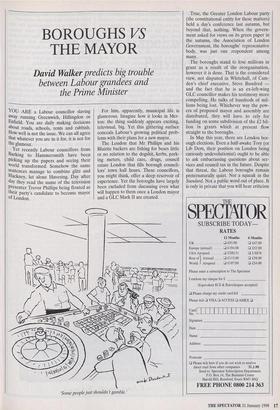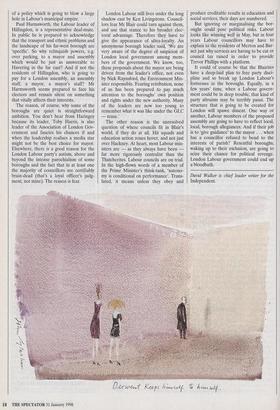BOROUGHS VS
THE MAYOR
David Walker predicts big trouble
between Labour grandees and the Prime Minister
YOU ARE a Labour councillor slaving away running Greenwich, Hillingdon or Enfield. You are daily making decisions about roads, schools, rents and rubbish. How well is not the issue. We can all agree that whatever you are in it for, it is not for the glamour.
Yet recently Labour councillors from Barking to Hammersmith have been Picking up the papers and seeing their world transformed. Somehow the same sentences manage to combine glitz and Hackney, let alone Havering. Day after day they read the name of the television presenter Trevor Phillips being floated as their party's candidate to become mayor of London. For him, apparently, municipal life is glamorous. Imagine how it looks in Mer- ton: the thing suddenly appears exciting, televisual, big. Yet this glittering surface conceals Labour's growing political prob- lems with their plans for a new mayor.
The London that Mr Phillips and his Blairite backers are fishing for bears little or no relation to the dogshit, kerbs, park- ing meters, child care, drugs, council estate London that fills borough council- lors' town hall hours. These councillors, you might think, offer a deep reservoir of experience. Yet the boroughs have largely been excluded from discussing even what will happen to them once a London mayor and a GLC Mark II are created.
'Some people just shouldn't gamble.' True, the Greater London Labour party (the constitutional entity for these matters) held a day's conference last autumn, but beyond that, nothing. When the govern- ment asked for views on its green paper in the autumn, the Association of London Government, the boroughs' representative body, was just one respondent among many.
The boroughs stand to lose millions in grant as a result of the reorganisation, however it is done. That is the considered view, not disputed in Whitehall, of Cam- den's chief executive, Steve Bundred — and the fact that he is an ex-left-wing GLC councillor makes his testimony more compelling. He talks of hundreds of mil- lions being lost. Whichever way the pow- ers of proposed mayor and assembly are distributed, they will have to rely for funding on some subdivision of the £2 bil- lion in grants which at present flow straight to the boroughs.
In May this year, there are London bor- ough elections. Even a half-awake Tory (or Lib Dem, their position on London being curiously undevolutionist) ought to be able to ask embarrassing questions about ser- vices and council tax in the future. Despite that threat, the Labour boroughs remain preternaturally quiet. Not a squeak in the Standard. Not a public word out of place. It is only in private that you will hear criticism of a policy which is going to blow a large hole in Labour's municipal empire.
Paul Harmsworth, the Labour leader of Hillingdon, is a representative deaf-mute. In public he is prepared to acknowledge that the transport and ethnic problems and the landscape of his far-west borough are 'specific'. So why relinquish powers, e.g. over parking, to a mayor and assembly which would be just as answerable to Havering in the far east? And if not the residents of Hillingdon, who is going to pay for a London assembly, an assembly staff, a mayor, a mayor's staff? Mr Harmsworth seems prepared to face his electors and remain silent on something that vitally affects their interests.
The reason, of course, why some of the boroughs are quiet is straightforward ambition. You don't hear from Haringey because its leader, Toby Harris, is also leader of the Association of London Gov- ernment and fancies his chances if and when the leadership realises a media star might not be the best choice for mayor. Elsewhere, there is a good reason for the London Labour party's autism, above and beyond the intense parochialism of some boroughs and the fact that in at least one the majority of councillors are certifiably brain-dead (that's a loyal officer's judg- ment, not mine). The reason is fear. London Labour still lives under the long shadow cast by Ken Livingstone. Council- lors fear Mr Blair could turn against them, and use that stance to his broader elec- toral advantage. Therefore they have to give the appearance of ultra-loyalty. An anonymous borough leader said, 'We are very aware of the degree of suspicion of London local government among mem- bers of the government. We know, too, these proposals about the mayor are being driven from the leader's office, not even by Nick Raynsford, the Environment Min- ister responsible. Fearing retribution, none of us has been prepared to pay much attention to the boroughs' own position and rights under the new authority. Many of the leaders are now too young to remember what it was like under the GLC — tense.'
The other reason is the unresolved question of where councils fit in Blair's world, if they do at all. Hit squads and education action zones hover, and not just over Hackney. At heart, most Labour min- isters are — as they always have been — far more rigorously centralist than the Thatcherites. Labour councils are on trial. In the high-flown words of a member of the Prime Minister's think-tank, 'autono- my is conditional on performance'. Trans- lated, it means unless they obey and produce creditable results in education and social services, their days are numbered.
But ignoring or marginalising the bor- oughs could pose political risks. Labour looks like winning well in May, but in four years Labour councillors may have to explain to the residents of Merton and Bar- net just why services are having to be cut or council tax raised in order to provide Trevor Phillips with a platform.
It could of course be that the Blairites have a deep-laid plan to free party disci- pline and so break up London Labour's fortresses in the boroughs. Equally, in a few years' time, when a Labour govern- ment could be in deep trouble, that kind of party altruism may be terribly passé. The structure that is going to be created for London will spawn dissent. One way or another, Labour members of the proposed assembly are going to have to reflect local, local, borough allegiances. And if their job is to 'give guidance' to the mayor. . when has a councillor refused to bend to the interests of parish? Resentful boroughs, waking up to their exclusion, are going to seize their chance for political revenge. London Labour government could end up a bloodbath.
David Walker is chief leader writer for the Independent.



































































 Previous page
Previous page